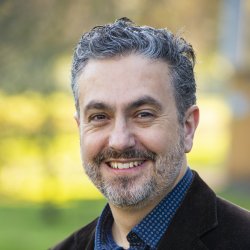Exploring AI Integration in Translation Studies – Collaborative workshops with students at the Centre for Translation Studies
Exploring GenAI integration in postgraduate curriculum via workshops & focus groups.
Postgraduate translation and interpreting programmes in the Centre for Translation Studies (CTS) jointly address the professional needs and research scope in the fields of spoken (interpreting) and written translation. This focus is a ‘constant’ in any MA programme in the field of Translation Studies – and very much so for over 40 years in CTS!
Yet nowadays there is an increasing need to shift emphasis towards a more pluralistic, holistic conceptualisation of translation as a technology-mediated access service, with three implications: a) traditional translation is seen in conjunction with more peripheral types (such as intralingual translation, or image-to-text and speech-to-text transfer); b) the agency of those who help deliver technology-mediated access needs to be emphasised, if recipients of said access are to participate and be integrated in social and cultural life; c) the role of humans in an era of increased automation needs to be critically explored, say, vis-à-vis the design, sustainable use or evaluation of technology-enabled workflows.
With the academic year all but over – the taught part of it, to be more precise – CTS marked the occasion with a ground-breaking initiative exploring some of the above topics. This was done under the auspices of the Faculty of Arts and Social Sciences (Teaching Award Fund) in a project, entitled “Translation in the era of generative artificial intelligence”. The project, which concluded this morning, explored the question of how Generative Artificial Intelligence (GenAI) can be further integrated into our postgraduate curriculum and entailed a series of workshops and focus groups with current CTS students. Participants in workshops worked with Large Language Models and other AI-powered interfaces, gaining hands-on experience in the use of GenAI for translation-related tasks, information mining and creativity in text output. Focus groups addressed the educational needs of postgraduate students, their motivation for using Gen-AI tools, perceptions vis-à-vis machine assistance (customisation to own needs, general attitudes towards how this technology is evolving), as well as the values underpinning Gen-AI use (such as the search for creativity). Most importantly, the project served as a platform for collecting feedback from students. It is through such feedback that we hope to equip future cohorts of our students with the skills needed for emerging industry profiles where technology-enhanced multilingual service provision is becoming the norm.


